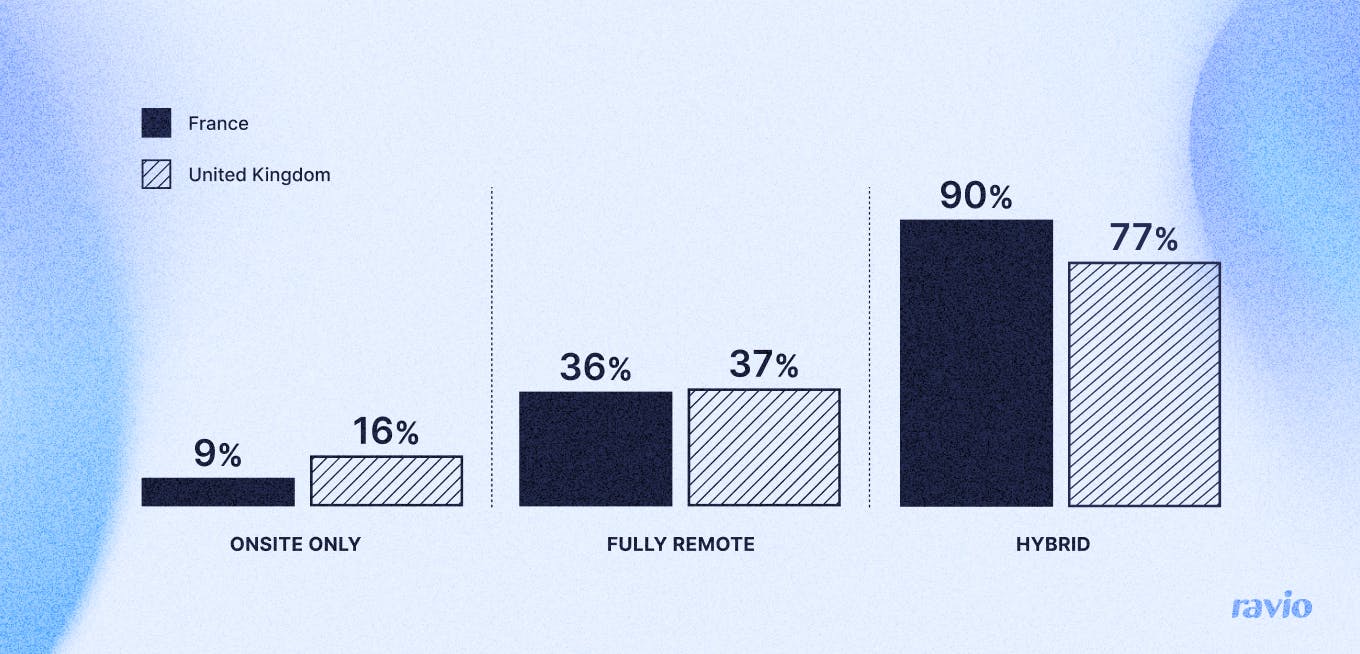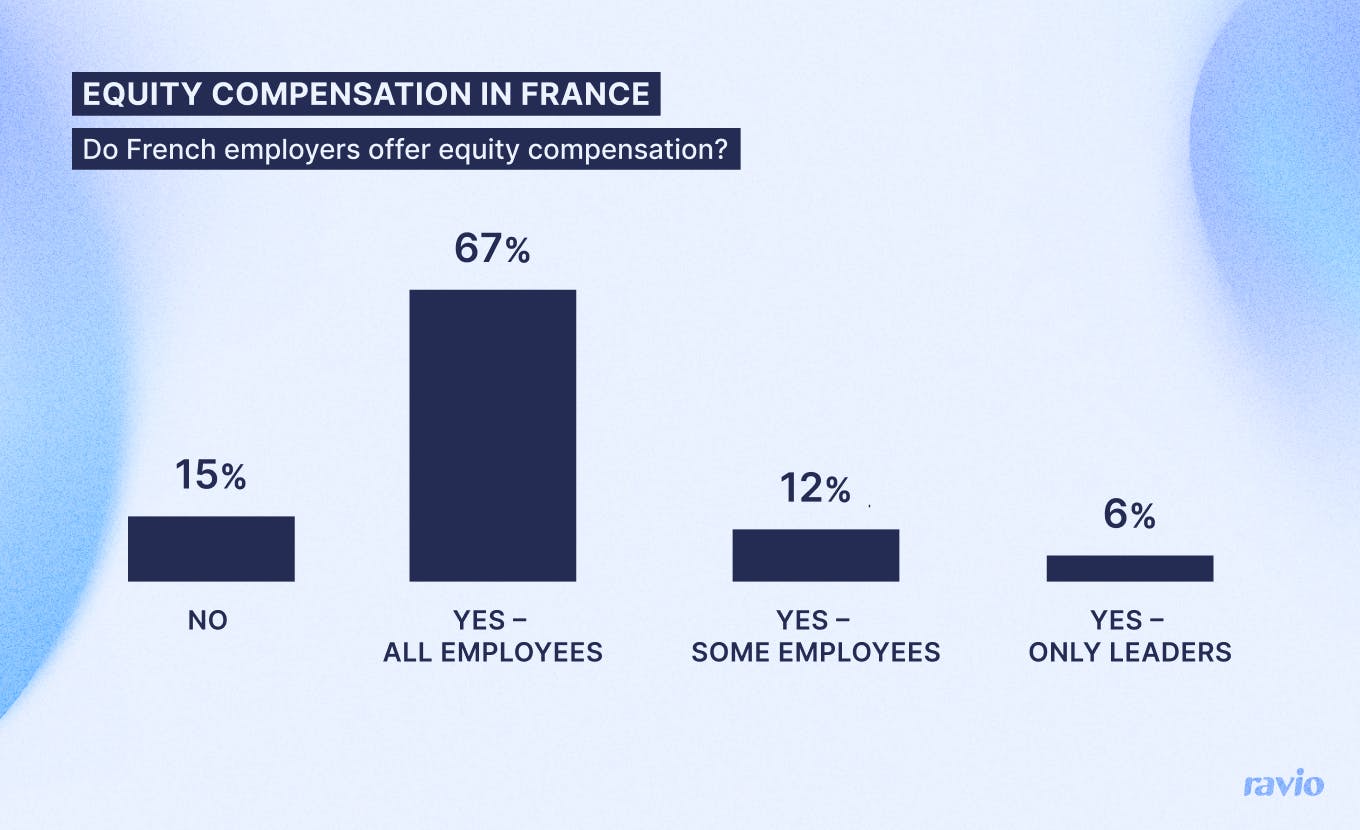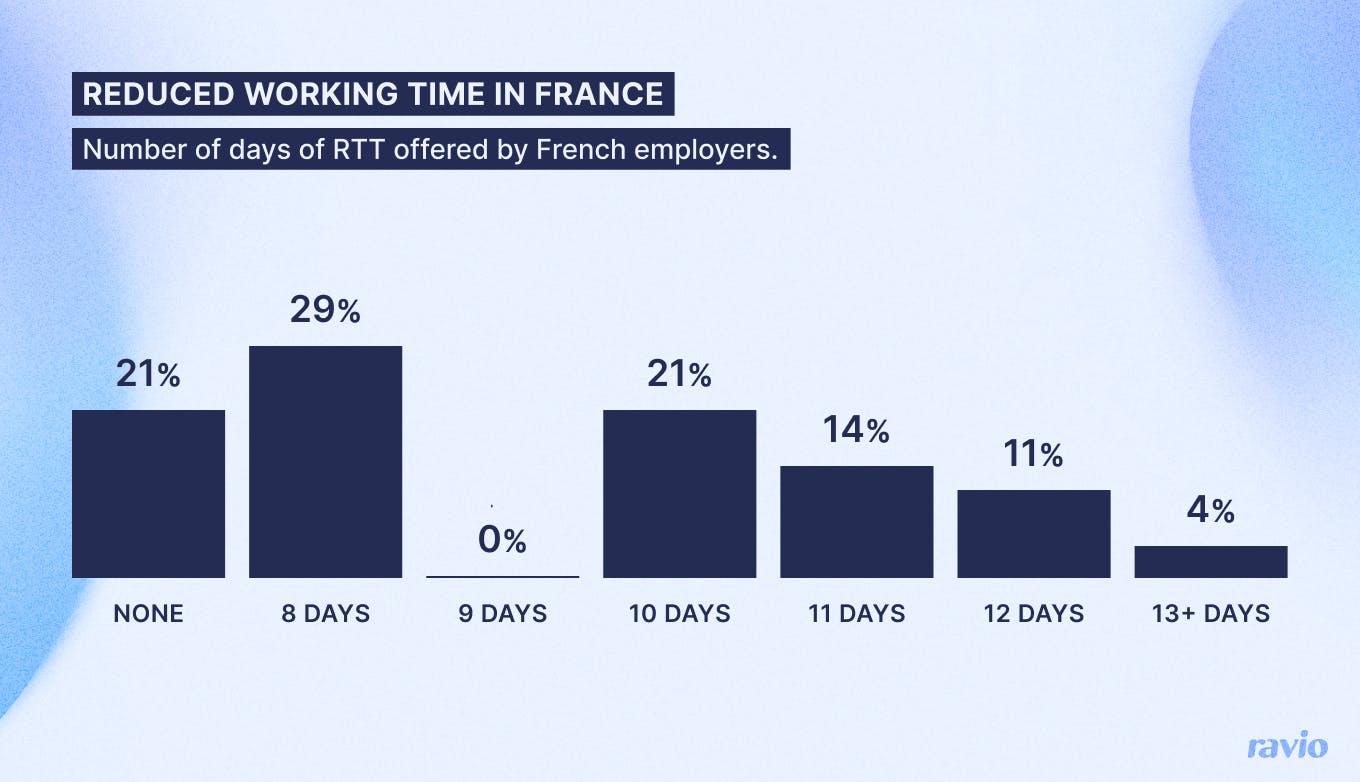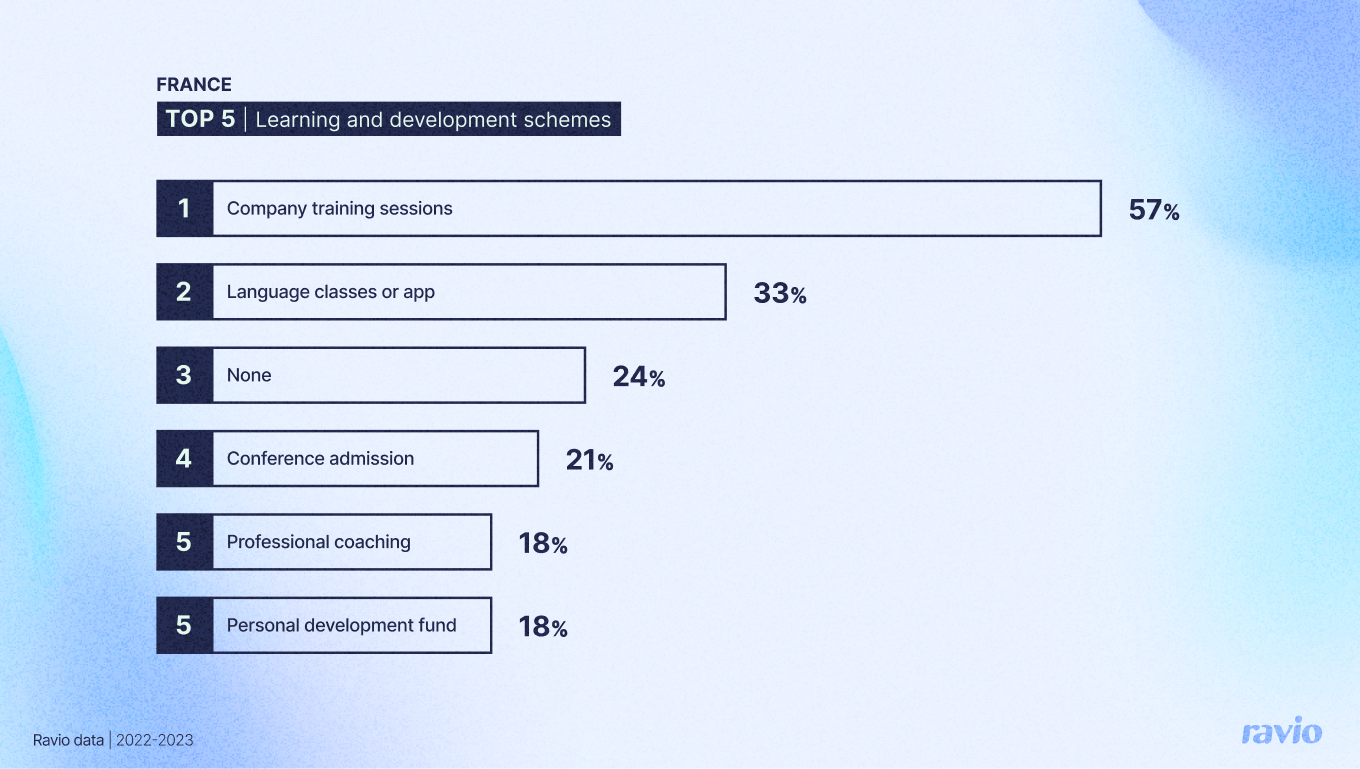In today’s competitive talent market, employers that differentiate themselves from the crowd of recruiters are the ones that are able to attract and retain top talent.
Studies prove time and time again that compensation is the top factor in attracting and retaining employees. As just one example, the latest McKinsey study on the topic (2022) found that in Europe for over 40% of the employees considering leaving their current role, the primary reason is ‘inadequate total compensation’.
Of course, base salary is a major part of this.
But, a great employee benefits package can be that extra element that makes you stand out to job candidates – as well as helping to motivate and retain existing team members.
In fact, research by May and OpinionWay found that 2 out of 3 employees in France would leave their current job for one with a better employee benefits package.
So what do competitive employee benefits look like?
Well, it actually varies significantly across Europe – which makes sense given that mandatory benefits and governmental schemes differ from country to country, as well as cultural differences.
In this article we’ll explore employee benefits in France, covering:
- Employee benefits benchmarking data – sharing insights from Ravio’s total compensation benchmarking dataset on what companies in France typically offer when it comes to employee benefits beyond mandatory requirements.
- The benefits employees are actually asking for – insights from recruiting expert Alexandra Pharisien (Talent Partner Manager at Skeelz) and benefits expert Boris Jottreau (CEO of May) on what job candidates and employees in France actually value and look for in an employee benefits package.
Benchmarking employee benefits in France
Mandatory employee benefits in France
French employment law is extensive, with the social security system in France for salaried workers one of the most comprehensive in Europe.
Mandatory employee benefits in France include:
- Paid time off. Under French labour law employees are entitled to a minimum of five weeks annual leave per year on top of public holidays.
- Sick leave. Employees in France are entitled to paid sick leave, paid for in part by the employer and part by the state via social security.
- Parental leave. Employees in France are entitled to paid parental leave – 16 weeks paid maternity leave or adoption leave minimum (more for multiple births or medical complications), or 25 days paternity/non-birthing partner leave. French employees are also entitled to take additional unpaid parental leave of up to one year before the child reaches the age of three, receiving benefits payments via social security.
- Private health insurance. Private health insurance (mutuelle ou complémentaire santé) is a mandatory benefit in France, with employers required to pay at least 50% of the costs.
- Retirement contributions. Employers and employees in France are both required to contribute to the employee’s pension via payroll contributions for the basic state pension, and many also for the mandatory supplementary pension.
- French commuting allowance. Employers in France must cover at least 50% of the costs for employees who commute by public transport – and there are also additional optional transportation schemes that employers can choose to offer, including the sustainable mobility package (forfait mobilité durable).
For more details on all of these mandatory employee benefits in France, take a look at this guide on employment and labour laws in France.
💡 How many employers in France offer above the legal required minimum for annual leave or maternity leave?
As we’ve seen, it’s mandatory under French labour law for employers in France to give employees paid time off for holidays as well as for maternity leave.
Often employers will offer employees paid time off above the legally required amount as an extra perk within their benefits package.
So how common is this with French employers? We analysed Ravio’s compensation dataset on the European tech industry to find out:
- Annual leave: 85% of French employers offer only the legally required amount of 25 days paid annual leave. Of the 15% of employers in France that offer above the legal requirement the most common approach today is to offer unlimited holiday days, with 12% of French employers giving employees unlimited paid annual leave.
- Maternity leave: 94% of French employers offer only the legally required amount of paid maternity leave, with only 6% offering above the statutory minimum maternity leave. However, 29% of French employers do offer above the legally required minimum paternity or non-birthing partner leave of 25 days, with 23% of employers in France offering 20+ weeks and 6% offering 6-10 weeks.
What are the top 5 optional employee benefits offered by French employers?
All employers in France offer those mandatory employee benefits as a legal requirement.
But what additional employee benefits are common for employers in France?
Analysing Ravio’s extensive compensation dataset for the European tech industry, the following emerge as the top 5 optional employee benefits offered by French employers:
- Flexible working
- Equity compensation
- Reduced working time (RTT)
- Learning and development
- Meal costs during work.
Flexible working in France
Flexibility and great work/life balance is hugely important in today’s world of work, and France is particularly strong in offering flexible working options as an employee benefit.
According to Ravio’s data, 90% of employers in France offer a hybrid working model – compared to 77% of UK employers that offer hybrid working.
36% of employers in France offer fully remote working (this could either be employees able to work from anywhere within the HQ country or workers employed in other countries via an EOR).

It’s also common for employers to offer employees additional support for working from home as a benefit, the three most popular being:
- 42% give employees a home office allowance to cover the costs of e.g. desks, office chairs etc.
- 21% offer the opportunity to work from anywhere for a set amount of time per year.
- 18% give employees an internet or electricity subsidy.
It’s clear that French employers are emphasising flexible working benefits for employees – and given (as we’ll hear later in this article from the recruitment experts at Skeelz) job candidates are prioritising flexible and remote options when job hunting, this makes sense.
With many of the big names in tech implementing return-to-office mandates in 2023 (the likes of Amazon, Tiktok, Grindr, Zoom, and more) and reducing flexible options, this can be a major point of differentiation for startups – even if you can’t compete on salary with these big names, you can still compete for those employees that value flexibility and remote working options.
Equity compensation in France
85% of French companies offer equity compensation to employees. This is slightly more than in the UK where 80% of employers offer equity compensation.
Of those companies that offer equity compensation, the majority (67% of companies) offer equity to all employees. 18% offer equity only to select roles, of which 6% only offer equity to founders and/or C-suite leadership team members.

Reduced working time (RTT) in France
Since 2000 it has been enshrined in employment law in France that the standard working week is 35 hours.
Employees are able to work longer than 35 hours per week, but this is viewed as overtime and it’s typical for employment contracts to include an overtime policy to account for it.
The most common policy is known as réduction du temps de travail or RTT (reduction of working time), which means that employees are given additional paid time off in exchange for any overtime worked.
Looking at Ravio’s data, we can see that 79% of French employers offer RTT as part of their employee benefits package.
Of the French companies that offer RTT, it’s most common to offer a maximum of 8 days of RTT per year, though many employers do offer more than this.

Learning and development benefits in France
76% of companies in France offer some form of learning and development benefits as part of their overall employee benefit package – supporting career development and progression is an important aspect of being a great employer in France.
Within this, the most common learning and development benefits to offer in France are company training sessions (57% of companies), access to language classes or apps (33% of companies), paying for conference admission (21% of companies), professional coaching (18% of companies), and a personal development fund (18% of companies).

Meal vouchers in France
It’s common for employers in France to offer some variety of payment for meals had during working hours, as part of their overall employee benefits package.
Some places of employment have a subsidised canteen. Others give employees a meal voucher through a scheme developed by the French government to support hospitality businesses, wherein employees are given a card to pay for meals during work hours, subsidised by their employer.
Ravio’s data shows that 57% of French employers provide meals for employees every day (which includes either providing meals in the office or a meal voucher).
What benefits do employees and job candidates in France really value?
The data outlined above shows us what employee benefits companies in France are currently offering. But does this reflect what employees and job candidates actually want from a benefits package?
Ravio’s Head of France, Gari Poniatowski, spoke to recruiting expert Alexandra Pharisien (Talent Partner Manager at Skeelz) and benefits expert Boris Jottreau (CEO of May) to find out.
Alexandra Pharisien: Job candidates want flexible working and help with work-related costs from an employee benefits package
Alexandra Pharisien is Talent Partner Manager at Skeelz and an expert on recruiting top talent in France – having worked with countless companies and job candidates.

Two key themes emerged from discussing what job candidates in France are actually looking for from potential employers when it comes to an employee benefits package with Alexandra: flexible working options and support with work-related costs.
“A candidate’s choice of which company to work for is highly influenced by the employee benefits package on offer – so, for companies, benefits are vital for recruiting talent. The most common benefits that candidates ask us about during recruitment are flexible working options and support with work-related costs such as home working or commuting costs.”
In terms of employers supporting with work-related costs, we’ve seen that there are many mandatory employer contributions under French labour law.
But, employees are actively looking for companies that go above and beyond the minimum legal requirements to support employees with work-related costs.
Specifically, candidates commonly ask Skeelz whether employers offer financial support for the following items:
- Home working costs. Job candidates in France see it as a huge bonus when employers offer support with covering the costs of home office set up or increased internet and energy bills – and as we saw from Ravio’s data this is something that employers do commonly offer.
- Co-working spaces. Similar to the above, companies that offer to pay for remote or hybrid employees to use co-working spaces close to their homes are highly desirable.
- Commuting costs. Particularly, job candidates want their employers to make sure they are able to benefit from the Sustainable Mobility Allowance in France.
- Meal costs. Job candidates in France prefer employers that support with the costs of meals during work hours – and we saw from Ravio’s data that it’s common for employers to provide office meals or meal vouchers.
- Personal services. For instance, employers that pay for or subsidise access to mental health services or childcare – services that support employees with work/life balance.
- Private health insurance above the legal minimum. We’ve seen that French employers are legally required to contribute to private health insurance for their employees – but job candidates are looking for employers that go above the minimum legal requirement of covering 50% of the costs of private health insurance.
When it comes to flexible working, Alexandra has noticed a marked increase over the past few years in the amount of job candidates seeking flexible options.
Employees are putting more and more value on personal wellbeing and work/life balance over just the salary that a company can offer. The Skeelz team now commonly speak with job candidates who reference the importance of enjoyable work, flexible hours, and career advancement opportunities.
“Today’s employees are open to trading salary for work-life balance and flexibility – they want to work condensed hours and they want to work from home at least some of the time.”
In fact, in their own research, Skeelz have found that:
- 71% of employees in France would prefer a role with a 4-day workweek
- 64% of employee in France would prefer flexible hours and/or remote working options.
Boris Jottreau: Personalisation is key to benefits packages that offer real value to employees
Boris Jottreau is CEO of May, an all-in-one employee benefits platform designed for French employers – so he knows his stuff when it comes to what employees are looking for in a benefits package, and what employers can offer.

Boris particularly emphasises the importance of two factors in building a benefits package.
Firstly, for Boris it’s vital that benefits are personalised to ensure value for each individual team member.
The wants and needs of each employee can vary significantly, depending on their age, living situation, spending habits, family dependencies, hobbies and interests, and so on. Whereas younger employees might prefer benefits like subsidised cinema tickets or Spotify subscriptions (and they want that to be easily accessible through a simple digital platform!), those with children would likely prefer employers to offer support with childcare costs.
This is especially true in a post-Covid environment, where our working lives have significantly changed – particularly with the growth of remote working, leading top talent to start to re-locate outside of France’s biggest cities.
“Before Covid-19 most employees had a similar life rhythm, which meant their needs when it came to benefits were fairly uniform. Now, the working lives of employees have become much more diverse – employees no longer live with a standard routine of metro-work-sleep-repeat.”
So, Boris strongly feels that a flexible approach to employee benefits works best – a package that offers enough variety that all employees find something of value, and which is flexible enough to enable employees to personalise those benefits to their individual needs.
“Variety, personalisation, and flexibility are key for a competitive employee benefits package today. Each employee’s needs vary significantly, so a flexible package that can be tailored to factors like age or lifestyle is key to ensure employees get real value from the benefits package.”
Secondly, Boris highlights the role of benefits that increase the purchasing power of employees – supporting employees with living costs and ensuring they can get the most possible out of their monthly paycheck.
Earlier in the article we saw that the social security system in France is strong, with many mandatory benefits and employer payroll contributions. On top of those mandatory benefits, the French government also has various other optional schemes (typically tax exempt) that employers can opt to enable their employees to benefit from at minimal cost – like meal vouchers or commuting schemes.
These schemes can support employees with living costs like food or transportation, increasing their purchasing power and effectively giving them more cash in the bank by helping their salary stretch further.
This is, of course, a huge bonus for employees. In fact, in a recent research project between May and OpinionWay, 89% of French employees said they want their company to do more to support their purchasing power.
“Employee purchasing power is a significant component of remuneration, increasing what employees are able to afford with their salary. Employees in France have lost about 5,000 euros in purchasing power per year compared to two years ago – and employers can help to restore this through creating the right employee benefit package.”
So, it’s clear that benefits that enhance employee purchasing power are definitely something French employers should absolutely be seeking to achieve when they build a benefits package.
We’ve seen from Ravio’s data that it’s common for French employers to support employees with the costs of meals during work hours – but there’s certainly potential for more benefits like this that support with work-related costs.



